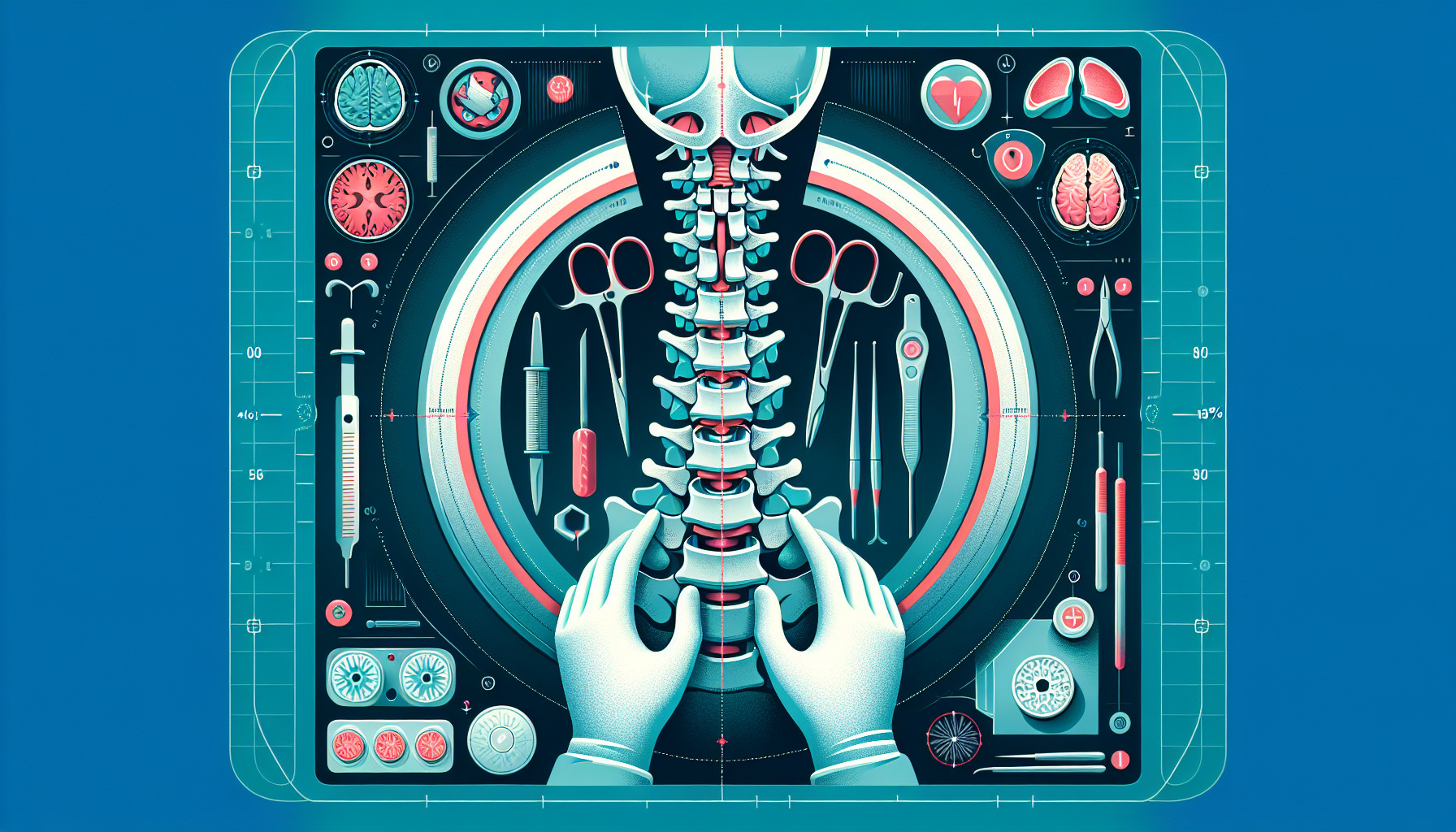Our Summary
This research paper analyzes the effectiveness of spinal fusion surgery, a common but expensive procedure that carries significant risk. The researchers found no high-quality reviews of the surgery and determined that the risk of bias in existing reviews of the surgery was high. The evidence currently available does not suggest that spinal fusion surgery is more beneficial than non-surgical treatments for back pain caused by degeneration. Similar conclusions were made for thoracolumbar burst fractures. The benefits of spinal fusion for isthmic spondylolisthesis, a condition in which a vertebra slips forward onto the bone below it, are unclear. Surgery for spinal cord compromise due to metastatic carcinoma (cancer that has spread to the spine) was found to improve mobility and neurological outcomes, but this conclusion is based on a single trial. The study concludes that better evidence is needed to accurately assess the effectiveness of spinal fusion surgery. Patients considering spinal fusion should be fully informed about the current evidence for their specific problem, including the potential benefits and risks of surgery compared with non-surgical treatments.
FAQs
- What conclusion did the research paper draw about the effectiveness of spinal fusion surgery for back pain caused by degeneration?
- According to the research, what are the benefits of spinal fusion for isthmic spondylolisthesis?
- What is the study’s recommendation for patients considering spinal fusion surgery?
Doctor’s Tip
A doctor might tell a patient considering spinal fusion surgery that it is important to carefully weigh the potential benefits and risks of the procedure. They may recommend seeking a second opinion and thoroughly discussing alternative treatment options before making a decision. It is also important for the patient to fully understand the current evidence and limitations surrounding spinal fusion surgery for their specific condition. Additionally, the doctor may advise the patient to maintain a healthy lifestyle, including regular exercise and proper body mechanics, to help support their spine and potentially prevent the need for surgery in the future.
Suitable For
Patients who are typically recommended spinal fusion surgery include those with:
Degenerative disc disease: Spinal fusion may be recommended for patients with severe degenerative disc disease causing chronic back pain and/or nerve compression.
Scoliosis: Spinal fusion is often recommended for patients with severe scoliosis that is causing pain, difficulty breathing, or other symptoms.
Spinal fractures: Spinal fusion may be recommended for patients with unstable spinal fractures, such as those caused by trauma or osteoporosis.
Spinal instability: Patients with spinal instability, such as spondylolisthesis or spinal stenosis, may be recommended for spinal fusion surgery to stabilize the spine and reduce symptoms.
Spinal tumors: Spinal fusion may be recommended for patients with spinal tumors that are causing spinal cord compression or instability.
Failed back surgery syndrome: Patients who have not had success with other treatments for chronic back pain may be recommended for spinal fusion surgery as a last resort.
It is important for patients to discuss the potential risks and benefits of spinal fusion surgery with their healthcare provider to determine if it is the right treatment option for their specific condition.
Timeline
Before spinal fusion surgery, a patient typically experiences chronic back pain, numbness or weakness in the legs, difficulty walking, and limited mobility. They may have tried non-surgical treatments such as physical therapy, medication, or injections without success.
After spinal fusion surgery, the patient will undergo a period of recovery that includes pain management, physical therapy, and restrictions on activities to allow the spine to heal properly. Over time, the patient may experience improved mobility, decreased pain, and a better quality of life. However, there are risks associated with spinal fusion surgery, including infection, nerve damage, and complications related to the hardware used in the procedure. It is important for patients to carefully weigh the potential benefits and risks of surgery before making a decision.
What to Ask Your Doctor
- What specific condition do I have that requires spinal fusion surgery?
- What are the potential benefits of spinal fusion surgery for my condition?
- What are the potential risks and complications associated with spinal fusion surgery?
- Are there any alternative treatments or therapies that could be considered instead of spinal fusion surgery?
- What is the success rate of spinal fusion surgery for my specific condition?
- What is the recovery process like after spinal fusion surgery?
- How long will it take for me to fully recover and return to normal activities after spinal fusion surgery?
- Are there any long-term effects or complications that I should be aware of after spinal fusion surgery?
- How many spinal fusion surgeries have you performed, and what is your success rate?
- Are there any specific lifestyle changes or precautions I should take after spinal fusion surgery to ensure the best possible outcome?
Reference
Authors: Harris IA, Traeger A, Stanford R, Maher CG, Buchbinder R. Journal: Intern Med J. 2018 Dec;48(12):1430-1434. doi: 10.1111/imj.14120. PMID: 30517997
